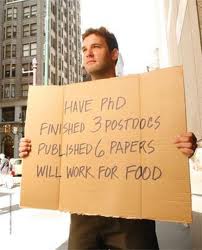 Adjunct, underemployed, and otheremployed professors have it tough. You’ve put in a lot of years into studying and want all your effort–and family sacrifices–to mean something. You make far less than you are worth, and it’s demoralizing and scary. (For earlier posts on this general topic, see here, here, here, here, and here.)
Adjunct, underemployed, and otheremployed professors have it tough. You’ve put in a lot of years into studying and want all your effort–and family sacrifices–to mean something. You make far less than you are worth, and it’s demoralizing and scary. (For earlier posts on this general topic, see here, here, here, here, and here.)
But….
You also have something that many of the “conventionally-employed” do not have:
You have a far greater degree of freedom of thought and expression because you are not as beholden to institutional evangelicalism.
I don’t say that lightly, having been among the ranks of the underemployed for a period of time. But it is precisely that experience–along with conferring with wise people over the years and watching what is happening around me–that brings me to this conclusion.
I am convinced that the present state of the “evangelical/fundamentalist experiment” is highly unstable for various intellectual and social reasons, and the pressing impetus for change from within is self-evident and not going away. There are simply too many on the inside who are calling for a re-examination of evangelical thinking and demanding that once-settled issues be opened up afresh.
For these types of conversation to gain traction and have an effect, I am convinced the driving force needs to come from
(1) those whose main income stream does not depend on institutional evangelicalism, and
(2) those who have the intellectual chops to pull it off.
I’m not demonizing institutional evangelicalism across the board. But even the best of them have realities to deal with that go beyond the luxury of supporting thought experiments, what-if thinking, and other sorts of boundary-pushing postures that destabilize tradition but are sorely needed. Institutions have–understandably–constituencies to appease, bills to pay, and paychecks to deliver to hard working people. That’s just a fact.
And this is exactly why change will more likely come from deep and competent thinkers, educators, and communicators, whose paychecks are not (wholly) dependent upon a system where self-preservation is a driving factor but where reform is needed.
Practically speaking, as I see it–and again, I don’t say this lightly– gifted and trained academics may have to think in terms of multiple income streams, where a significant portion, if not all, of their total income comes from outside of institutional evangelicalism.
Of course, income is a main stressor in all this, and I understand the pressures. I was underemployed in academia for about 3 1/2 years, and for part of that time I had to think very creatively about how to generate multiple income streams. It wasn’t easy.
How each one of you addresses the financial realities of being academically underemployed can’t be scripted. Working that out is an emotional and spiritual journey. But that’s another topic for another day. My point today is more focused.

I am trying hard not to sound like a motivational speaker or like I’m trying sell you a timeshare at a weekend retreat, but I truly think you have a unique opportunity to make the kind of difference that is needed and that others can’t as easily take part in .
You are the ones who are in the best position to carve out a new “academic model,” one that may have to by-passes institutional evangelicalism (and its gatekeepers) almost entirely and appeal directly to the grassroots.
You have the freedom to be part of building the future by not being tied to structures of the past.
